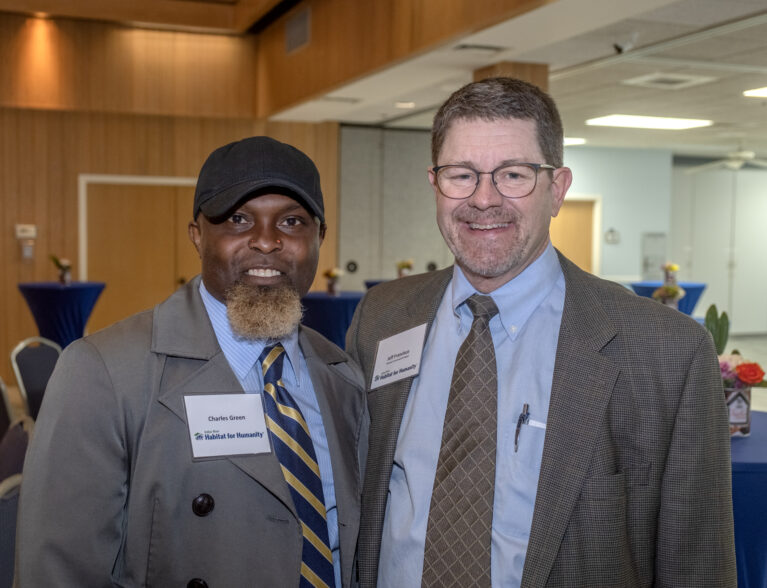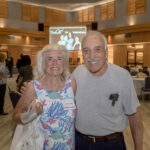
Indian River Habitat for Humanity celebrated the power of community and generosity during its annual Donor Reception at the Holy Cross Parish Hall. The event, attended by donors, volunteers and Habitat homeowners alike, was an opportunity to acknowledge their vital support while also sharing stories of impact and transformation.
“You do so much more than just help us build houses,” said Habitat board member Connie Poppell, welcoming everyone. “You help us build homes and hope. What you do for Habitat is priceless.”
Trevor Loomis, IR Habitat executive director, expressed his gratitude as well, acknowledging their pivotal role in fulfilling Habitat’s mission of providing safe and affordable housing for families in need.
“Every nonprofit has to raise money. This community is so generous and has really stepped up to the plate. In the face of the affordable housing crisis, we’re raising over $1 million more every year than what we were doing just two years ago,” said Loomis.
Loomis also highlighted the RV Care-A-Vanners, a group of volunteers who travel around the country in recreational vehicles, stopping to volunteer at Habitat construction sites.
“Since 2020, Indian River County went from a relatively reasonable place to live, to now being the most expensive housing market in the country when compared to wages. So people are spending a higher proportion of their money every month on housing costs, if they can even find a place to live,” said Loomis. “We’re doing as much as we can to meet the need.”
He commented that IR Habitat is on track to build at least 16 new houses this year and, by the end of June, they will have provided more than 100 families with critical home repairs.
Additionally, their scholarship program is creating opportunities for educational advancement for homeowners and their dependents.
Loomis noted that their new Housing Counseling program is meant to assist potential homeowners, adding that, “Historically, it was harder to get into Habitat than it was to get into Harvard.”
The program is designed to accommodate every person who comes through their doors, assisting them with their housing needs, financial literacy training, and one-on-one counseling on an ongoing basis to determine their individual road maps to housing stability.
He said they have already served more than 100 families in the first few months of the program’s operation.
Loomis also disclosed that they have 115 lots and pieces of land under development, which are slated for Habitat homes over the next five years.
The Critical Home Repair program is another success, having increased from serving 60 per year to 100 low-income homeowners. He said these are often aging individuals who have owned their homes for a long time and need repairs to make their homes safe and secure.
A panel discussion featured two Habitat homeowners and a dedicated volunteer who shared the profound impact of Habitat’s work on their lives. Attendees gained insight into the journey of homeownership, illustrating that in addition to providing shelter, the process fosters empowerment and stability.
For more information, visit IRCHabitat.org.
Photos by Joshua Kodis
- Charles Green and Jeff Francisco
- Helen and Andy Bowler
- Trevor and Martha Loomis
- Rick and Susan Hahn with Heidi and David Sommers
- Barbara Crosby and Yamilet Cendejas
- Caryn and John Morrow with Jim Raphalian
- Martha Loomis and Barbara Middleton
- Debra Piga and Denise Piga
- Gisela Elliston and Judy Myers
- Joann Ballacchino with Sharon and Jack Pulsifer
- Christine M. Connolly and Bob Spadacine
- Al and Carol De Renzo
- Meredith Egan, Deana Shatley and Jessica Schmitt
- Gene and Jean Cravens
- Heidi and David Sommers
- Connie Lawson and Susan Limoncelli




















